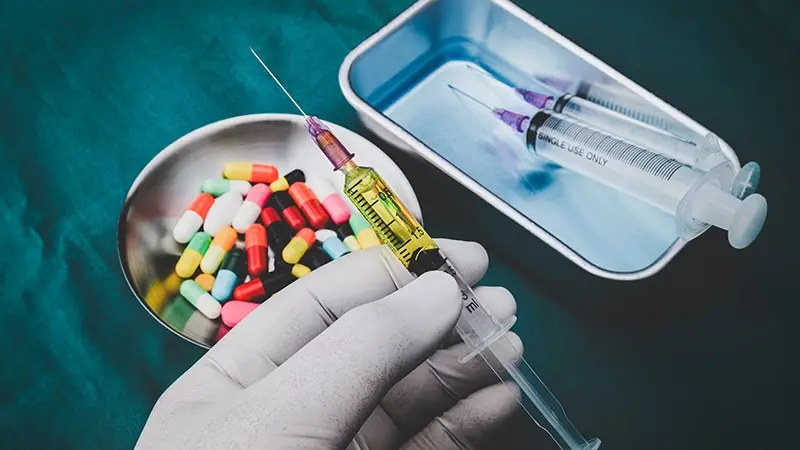The use of steroids in combat sports has become a significant area of concern and debate. Steroids, or anabolic-androgenic steroids, are synthetic substances similar to the male sex hormone testosterone. They are known for their ability to increase muscle mass and strength, which can give an athlete an unfair advantage in a physical competition such as boxing, mixed martial arts, or wrestling. However, the benefits come with considerable risks that can have severe implications for an athlete’s health.
In combat sports, the integrity of competition is paramount. Athletic commissions and sports organizations have established stringent anti-doping regulations and testing protocols to deter athletes from using performance-enhancing drugs (PEDs). Despite these efforts, instances of steroid use continue to surface, raising questions about the effectiveness of current testing methods and the culture of performance enhancement in high-stakes athletics.
Quick Summary
- Steroids are synthetic substances that can improve performance but pose health risks.
- Combat sports have strict anti-doping measures to maintain fair competition.
- Challenges in enforcement suggest the need for ongoing discussions on steroid use in sports.
Understanding Steroids

Steroids are a significant area of concern in combat sports, with a focus on their types, mechanisms of action, and implications for performance enhancement.
Types of Steroids
There are two primary types of steroids relevant to combat sports: anabolic steroids and corticosteroids. Anabolic steroids, including testosterone and synthetic derivatives, are used primarily to increase muscle mass and strength. Corticosteroids are used for their anti-inflammatory effects and are generally not performance-enhancing.
- Anabolic Steroids:
- Testosterone
- Anabolic-Androgenic Steroids (AAS)
- Corticosteroids:
- Not typically associated with performance enhancement
Mechanisms of Action
Anabolic steroids function by mimicking the effects of naturally occurring testosterone in the body. They bind to androgen receptors in muscle cells, leading to increased protein synthesis. This, in turn, can lead to muscle growth and performance enhancements.
Examples include:
- Increase in muscle protein synthesis
- Enhanced recovery from high-intensity training
Human growth hormone (HGH) also plays a role as it promotes growth in tissues and the metabolism of fats, though it is not a steroid.
Steroids vs. Performance Enhancement
The use of anabolic-androgenic steroids is associated with increased physical performance. However, steroids also carry the risk of significant health side effects. These can include liver damage, hormonal imbalances, and behavioral changes. The route to performance enhancement through steroids is inherently tied to potential health risks.
- Performance Enhancement:
- Increased muscle mass and strength
- Improved recovery times
- Health Side Effects:
- Cardiovascular issues
- Liver damage
- Hormonal imbalances
References
Steroids in Combat Sports

Steroids and other performance-enhancing drugs pose significant challenges in combat sports, raising questions about fairness, athlete health, and the integrity of competition.
Prevalence in Athletics
Steroid use is not uncommon among athletes who are seeking a competitive edge. In combat sports, which demand both strength and endurance, doping can have a particularly pronounced impact.
- Frequency: Despite rigorous testing protocols, some athletes in combat sports attempt to use steroids to enhance performance.
- Detection: The World Anti-Doping Agency (WADA) oversees testing to identify and discourage the use of banned substances.
Combat Sports Specifics
In disciplines like boxing, mixed martial arts (MMA), and wrestling, the use of steroids can significantly improve an athlete’s power and recovery time.
- Impact: Athletes who use steroids in combat sports may experience increased muscle mass and aggressiveness.
- Outcome: This unfair advantage is detrimental to the spirit of the sport and can potentially harm the health of the user and opponents.
Legal and Ethical Considerations
The legality and ethical implications of steroid use differ across regions, but universally, it compromises the integrity of sportsmanship.
- Regulations: National and international bodies impose bans on steroids and have developed detailed policies to deter use.
- Ethics: The ethical breach of using steroids is widely recognized and condemned in the world of sports.
Health Implications

The use of steroids in combat sports presents a range of health implications that professional athletes need to be aware of. These implications can be categorized into short-term effects, long-term consequences, and psychological impact, each carrying its distinctive set of challenges for the individual.
Short-term Effects
Side effects of steroid use in the short term include fluid retention and acne, as steroids can lead to an increase in oil production in the skin. Athletes often experience gynecomastia, which is the enlargement of breast tissue in men, as well as testicular atrophy, wherein the testicles shrink due to reduced natural testosterone production, a condition known as hypogonadism.
- Fluid retention
- Acne
- Gynecomastia
- Testicular atrophy
- Hypogonadism
Long-term Consequences
Over the years, health risks associated with prolonged steroid use become severe. Prolonged exposure to these substances can lead to heart attacks and strokes, due to changes in cholesterol levels and blood pressure. Infertility is a significant concern due to the disruption of natural hormone production, and baldness can also occur as a long-term cosmetic side effect.
- Heart attacks
- Strokes
- Infertility
- Baldness
Psychological Impact
Steroids have a profound impact on the psychological state of an athlete. Steroid users may experience mood swings and increased aggression, often referred to as “roid rage.” The dependency on steroids can also lead to mental health issues such as depression once use is discontinued.
- Mood swings
- “Roid rage”
- Mental health issues (e.g., depression)
References
Regulations and Testing

In combat sports, stringent regulations and testing protocols are enforced to maintain fair play and athlete health. The World Anti-Doping Agency sets the global standard for anti-doping rules, while various organizations are tasked with implementation and enforcement.
Anti-Doping Organizations
The World Anti-Doping Agency (WADA) is the cornerstone of the global anti-doping system, establishing the list of prohibited substances and methods. National anti-doping organizations (NADOs), like the United States Anti-Doping Agency (USADA), work alongside international federations to enforce these standards at the country level. In MMA, the Ultimate Fighting Championship (UFC) has also contracted USADA to oversee their anti-doping program.
Testing Procedures
Athletes in combat sports are subject to both in-competition and out-of-competition testing. Testing procedures typically include collection of urine and/or blood samples, which are analyzed for controlled substances and Schedule III drugs, among other prohibitions.
- In-Competition: Testing is performed around the time of the event.
- Out-of-Competition: Random tests can occur at any time and any place.
Penalties for Violations
When athletes test positive for a banned substance, repercussions are significant:
- Suspension: Periods of ineligibility can range from a few months to several years.
- Fines: Athletes can also face steep financial penalties.
- Reputation: Beyond formal penalties, there’s an impact on the athlete’s reputation and career.
Penalties vary depending on the substance, the athlete’s history with anti-doping violations, and the specifics of the case.
Beyond the Stereotype

The discourse on steroids in combat sports extends beyond the usual stigma and misconceptions, touching upon their legitimate medical applications, societal perceptions, and the ongoing developments in science.
Therapeutic Uses
Steroids have clinical relevance, particularly in androgen replacement therapy, which aims to mitigate symptoms of hormone deficiencies in patients. This form of therapy can be crucial for individuals for whom natural hormone production is impaired, necessitating medical intervention to maintain normal physiological functions.
- Testosterone replacement therapy:
- Indicated for: Men with low testosterone levels.
- Outcomes: Improved muscle mass, bone density, and overall well-being.
In combat sports, therapeutic use exemptions (TUEs) may be granted for athletes with recognized medical conditions requiring steroids, which are otherwise banned substances. Adherence to a consensus statement on steroid use within guidelines is mandatory for this exception.
Social Perspectives
Society’s view of steroid use in combat sports is often characterized by skepticism and negative connotations. Despite this, there is growing recognition of the complexity surrounding steroid use, including their legitimate medical applications.
- Public Opinion:
- Often critical of steroid use in sports.
- Increasingly aware of nuanced discussions about therapeutic uses.
The conversation is evolving, acknowledging that steroid use is not a black-and-white scenario and that there is a need for informed dialogues that consider both ethical implications and the realities of those needing hormonal therapy.
Evolving Science
The science underpinning the use of steroids, both in clinical settings and sports, is ever-evolving. Research continually offers new insights into how nutrition, hormone regulation, and steroid metabolism interact, which in turn informs the best practices for their use.
- Current Research Topics:
- Impact of nutrition on steroid efficacy.
- Longitudinal studies on the effects of steroids in athletes.
Scientists are working towards a deeper understanding of steroids, leading to more sophisticated consensus statements on their use and the refinement of guidelines for both therapeutic and performance contexts.
References
- “Androgen Replacement Therapy.” EndocrineWeb. https://www.endocrineweb.com/conditions/low-testosterone/androgen-replacement-therapy
- “Consensus statement on the use of testosterone therapy in men with hypogonadism.” Frontiers in Hormone Research. https://www.frontiersin.org/articles/10.3389/fendo.2019.00645/full
- “Therapeutic Use Exemptions.” World Anti-Doping Agency. https://www.wada-ama.org/en/what-we-do/science-medical/therapeutic-use-exemptions
Frequently Asked Questions

This section explores critical queries regarding the implications of steroid usage in the realm of professional combat sports.
What are the consequences of using steroids in professional boxing?
In professional boxing, steroid usage leads to severe penalties including suspensions, fines, and potential revocation of titles. The boxer’s reputation suffers, and they face scrutiny from the boxing commission and fans.
How do performance-enhancing drugs affect an MMA fighter’s career?
An MMA fighter found using performance-enhancing drugs can face lengthy bans, hefty fines, and disqualification from bouts. This not only tarnishes their career record but also affects their future fight prospects and marketability.
What is the prevalent attitude towards steroid use in the UFC’s anti-doping policy?
The UFC enforces a strict anti-doping policy, executed by the U.S. Anti-Doping Agency (USADA), which has a zero-tolerance approach to steroid use. Athletes are subject to routine and random drug tests throughout the year to ensure compliance.
Which performance-enhancing substances are commonly detected in combat sports?
Substances like stanozolol, nandrolone, and testosterone boosters are commonly detected in combat sports. These steroids are purported to enhance endurance, strength, and overall performance.
How can steroids impact the health of combat athletes in the long term?
Long-term steroid use among combat athletes can lead to cardiovascular problems, hormonal imbalances, and liver damage. Psychological effects such as aggression and addiction are also associated risks.
What are the legal implications for combat sports athletes found using steroids?
Legally, athletes caught using steroids may face lawsuits, breach of contract actions, and the prospect of returning prize money. Their ability to compete in professional sports could be substantially or permanently hindered.
Dr. Grant Fourie, a specialist in male hormones, is based in Cape Town, South Africa. He provides comprehensive treatments for conditions related to low testosterone, such as erectile dysfunction, fatigue, and mood changes. His methods include hormone replacement therapy and other modern treatment options.
Contact me via email or phone to book personal appointment in my clinic: The Village Square, Cape Town - South Africa



